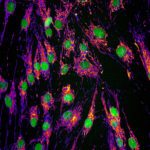Link to Pubmed [PMID] – 30389680
Link to DOI – e928810.15252/emmm.201809288
EMBO Mol Med 2019 01; 11(1):
Disturbances in the morphology and function of mitochondria cause neurological diseases, which can affect the central and peripheral nervous system. The i-AAA protease YME1L ensures mitochondrial proteostasis and regulates mitochondrial dynamics by processing of the dynamin-like GTPase OPA1. Mutations in YME1L cause a multi-systemic mitochondriopathy associated with neurological dysfunction and mitochondrial fragmentation but pathogenic mechanisms remained enigmatic. Here, we report on striking cell-type-specific defects in mice lacking YME1L in the nervous system. YME1L-deficient mice manifest ocular dysfunction with microphthalmia and cataracts and develop deficiencies in locomotor activity due to specific degeneration of spinal cord axons, which relay proprioceptive signals from the hind limbs to the cerebellum. Mitochondrial fragmentation occurs throughout the nervous system and does not correlate with the degenerative phenotype. Deletion of Oma1 restores tubular mitochondria but deteriorates axonal degeneration in the absence of YME1L, demonstrating that impaired mitochondrial proteostasis rather than mitochondrial fragmentation causes the observed neurological defects.

